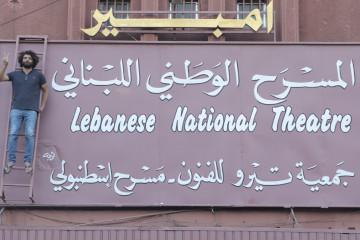

For 28 years, Ampere Cinema in Tripoli, north Lebanon, has been left to the ravages of time.
This weekend, the cinema reopened its doors as a community cultural space, restored by Tiro Association for Arts (TAA) and inaugurated with a theatre festival.
Rebranded as The Lebanese National Theatre, the old cinema played host to the first edition of the Tripoli International Theatre Festival, organized by TAA – the first event held at the space, now intended as a free and independent cultural forum for people, where artistic training workshops, festivals, and artistic performances will be organized, as well as a public library.
"Like all of TAA’s work, the cinema is part of its mission to decentralize culture and bring the arts to marginalized or underprivileged communities. For Tripoli – Lebanon’s impoverished and more conservative northern city – cultural offerings are few and far between"
“It won't be a commercial cinema or space that needs people to pay money to watch art. It's free; anyone can use the cinema.” TAA founder, actor and cultural activist Kassem Istanbouli told The New Arab.
“The festival featured a carnival in the streets. We brought people from the refugee camps in Tripoli and also from the camps in the south.
“We'll have Lebanese, Syrian and Palestinian artists, as well as companies coming from Mexico, Spain, Oman, Algeria, Morocco, Mauritania, and Kurdistan. We have 12 performances from Lebanon,” he added. “Some companies will stay with us and we'll organize more festivals, training sessions, film screenings and the theatre will be open every day.
Like all of TAA’s work, the cinema is part of its mission to decentralize culture and bring the arts to marginalized or underprivileged communities. For Tripoli - Lebanon’s impoverished and more conservative northern city - cultural offerings are few and far between.
Since 2014, TAA has been working on recovering abandoned cultural spaces and putting them to good use.
Based in Tyre, most of their work took place in southern Lebanon, but the new space in Tripoli now acts as a bridge, bringing together different communities from opposite ends of the country through artistic exchange.
“Our aim is to bring cultural balance to Lebanon, instead of everything being in the capital, we want to decentralize and bring activities to these areas without culture,” Istanbouli said. “We’re a volunteer group that started by rehabilitating the old cinemas in South Lebanon. We've already renovated Cinema Al Hamra and Cinema Rivoli in Tyre and Stars Cinema in Nabatieh.
“They're all now free cultural spaces where we organize different festivals every year,” he added, “such as theatre, cinema, music and dance performances, storytelling, and we do different types of training and theatre workshops for children and youths.”
Ampere Cinema, build in 1937 as the second cinema in the country’s history, is now part of their network and once again the oldest cinema open in Lebanon, whilst also being one of the oldest in the region.
The cinema was closed during the Lebanese civil war and conflicts with Israel in the 1980s. After the war in 1990, the cinema opened only on Eid or special occasions, before closing for good a few years later.
It took TAA’s volunteers about seven months to restore it to a usable state, through a combination of donations and funding from Denmark’s Doen Foundation and the Euro-Mediterranean Foundation of Support to Human Rights Defenders (EMHRF).
“It's really a big thing to have this cinema from this time in history open again after almost 30 years. Tripoli used to be a cinema city - it had the biggest number of cinemas in the whole of Lebanon,” Istanbouli said.
“We started renovating Ampere this year and it's been a dream of ours since 2016. We were rehabilitating the Ampere Cinema with the team from TAA, from the south and from Tripoli; we became a big family together and we started to work in the cinema because we have a background in this type of work.
“It's all about how we can keep the building and the memories alive, to make the cinema alive again, whilst keeping the old history and the structure of the building as it was before,” he added, “everything from the colours to the decorations, which is a big challenge because it was left abandoned for so long.”
The restoration is still ongoing, as the property’s three decades of dereliction have left much to repair. When Istanbouli first entered the cinema, the mess and damage were immense. Now, the original red velvet seating has been cleaned and the drab concrete exterior livened up with terracotta paint.
“It was dark but we rushed inside the cinema because we have the passion to discover the space, discover the building and it was magical,” he said. We started to look with lights from our phones and the smell was very bad.
“You couldn't get around much inside and there was a lot of trash and water damage on the walls,” he added. “The cinema still needs a lot of work - we have problems in places where water got inside in the winter and damaged the chairs and the walls - but day by day we're fixing bits and revitalizing the space.”
Maghie Ghali is a British-Lebanese journalist based in Beirut. She worked for The Daily Star Lebanon and writes as a freelancer for several publications, including The National, Al Arabiya English, Al Jazeera and Middle East Eye, on arts and culture/design, environment and humanitarian topics.
Follow her on Twitter: @mghali6
![The exterior facade of the newly refurbished cinema, now community centre, in Tripoli [photo credit: Maghie Ghali]](/sites/default/files/styles/medium_16_9/public/2022-09/Untitled%282%29_0.jpg?h=d1cb525d&itok=xhNDCUEy)
![One of the theatre workshops at the TAA [photo credit: Maghie Ghali]](/sites/default/files/styles/medium_16_9/public/2022-09/Untitled%281%29_3.jpg?h=d1cb525d&itok=HfpujYqS)
![Istanbouli looking through the cinema remains, finding old film reels [photo credit: Maghie Ghali]](/sites/default/files/styles/medium_16_9/public/2022-09/Untitled%283%29_1.jpg?h=d1cb525d&itok=je2TISo8)




 Follow the Middle East's top stories in English at The New Arab on Google News
Follow the Middle East's top stories in English at The New Arab on Google News


